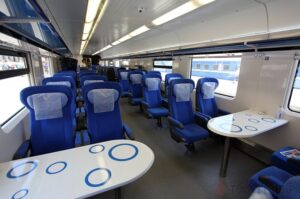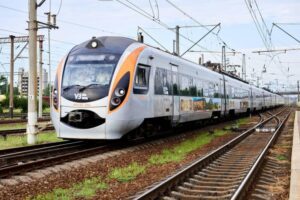
Ukrzaliznytsia (UZ) plans to raise ticket prices for SV and first class Intercity to partially compensate for losses from passenger transportation, said Serhiy Leshchenko, deputy chairman of the UZ supervisory board.
“We plan to raise dynamic pricing for SV and first class Intercity. This will partially improve the results, but not completely,” he said from the rostrum of the Verkhovna Rada, where he was summoned by deputies the day before, according to a correspondent from the Interfax-Ukraine agency.
Leshchenko noted that in order to avoid losses from passenger transportation altogether, it is necessary to increase passenger transportation prices by 3-4 times, which is impossible during the war.
The last time Ukrzaliznytsia raised prices was on February 1 this year for international trains to Poland and Hungary – by 17-37%. Thus, due to a reduction in discounts, the cost of tickets to Poland increased by 20-27% in 1st class “Intercity+” and SV carriages and by 9-27% in compartment carriages. The cost of travel on the most popular international trains: Kyiv-Warsaw increased by 37%, Kyiv-Budapest by 17% in SV carriages and by 21% in compartment carriages.
According to Ukrzaliznytsia’s expectations, which were presented in the 2026 state budget draft, losses from passenger transportation in 2025 will amount to UAH 20.8 billion, in 2026 – UAH 22.3 billion, in 2027 – UAH 24.7 billion, and in 2028 – UAH 29.4 billion.
According to the company’s results for 2024, losses in the passenger transport segment increased by UAH 2.4 billion, or 15.4%, to UAH 18.1 billion, which was covered by profits from the freight transport segment, which amounted to UAH 20.4 billion. At the same time, the company forecasts a sharp decline in freight transportation profits in 2025 to UAH 0.9 billion, moderate growth in 2026 to UAH 9.0 billion, in 2027 to UAH 12.6 billion, and in 2028 to UAH 19.3 billion.
Overall, in 2024, UZ increased its revenue by 11.1% to UAH 102.87 billion, but incurred a net loss of UAH 2.71 billion compared to a net profit of UAH 5.04 billion in 2023.

The Verkhovna Rada has ratified the Framework Agreement between the governments of Ukraine and the Republic of Korea on loans from the Fund for Economic Development and Cooperation for 2024-2029, which opens up the possibility for Ukrzaliznytsia (UZ) to purchase another 20 Intercity+ electric trains.
“This decision paves the way for the final part of approvals on financing projects critical to the Ukrainian economy, including the program to expand Ukrzaliznytsia’s rolling stock – the purchase of 20 Intercity+ electric trains. The program has already received a favorable assessment from experts involved by the Korean Fund,” Ukrzaliznytsia said on its Facebook page on Thursday.
The ratification of the agreement was supported by 336 MPs at a parliamentary meeting on Wednesday.
According to the report, the next steps will include agreeing on the details of the project and the agreement at the Cabinet of Ministers level and the final signing of the agreement.
According to preliminary agreements, the total cost of the program will be about $450 million, including train maintenance for five years. The trains are expected to be delivered within 18-24 months after the agreement is signed.
It is emphasized that Korean manufacturers are interested in considering options for partial localization in Ukraine.
According to UZ, the loan terms are preferential, given the criticality of the social component of the project: the total term is up to 40 years, and the repayment of the loan body will begin after the first 10 years.
“This is a strategic program to expand the Intercity+ train fleet, which will allow us to increase traffic on existing and open new high-speed routes. This is an additional opportunity for 6 million passengers a year to travel, which will cover the current need for daytime high-speed traffic,” Yevhen Lyashchenko, chairman of the board of UZ, was quoted as saying in the statement.
For his part, Oleksandr Shevchenko, UZ’s spokesman for passenger services, noted on his Facebook page that this summer the railroad is serving 100,000 people a day, and many are facing a shortage of tickets.
“Yes, we provide monitoring, car buybacks, transfers, hub connections, and turn over cars twice a day with maximum efficiency, but this does not eliminate the fundamental problem of car shortages,” he wrote, listing a number of objective reasons for the situation.
Shevchenko notes that at the current rate of retirement/ageing/destruction of railcars, the shortage of railcars risks becoming critical by 2028.
“That is, you will have a conditional 30% chance of finding a ticket to Lviv, modeling a kind of optimism,” he said, adding that one solution to the problem is to purchase an additional 20 units of Korean Hyundai Rotem trains.
Shevchenko also reminded that UZ is simultaneously modernizing cars on its own, and Kryukiv Carriage Works (Poltava region) is actively building 66 new sleeping cars, including inclusive ones.

Ukrzaliznytsia has successfully completed testing Starlink-based wi-fi on Intercity trains, head of the company Alexander Kamyshyn said in Telegram on Tuesday.
“Test results: availability on the route 97%, speeds up to 100 Mbps. Vice Prime Minister Kubrakov has set us the task now to deploy the pilot to all Intercity trains. By the end of the year the task will be accomplished”, – noted the head of the railway operator.
According to his words, the train was equipped with Starlinks “by partisan methods” and tested on different routes for more than 100 days.
Kamyshin said that he called from the train via video link to the Deputy Prime Minister Mikhail Fedorov and thanked him for his support.
In turn, Fedorov said that Ukrzaliznytsia has already received 450 Starlink terminals and by the end of the year will receive another part, in particular, from the batch that Germany will provide Ukraine in early February.
“Thousands of Starlink we will receive from Germany, I think, in early February,” said the deputy prime minister.
As reported, the last batch – 8 thousand terminals – was helped to Ukraine by Poland. More than 30 thousand Starlink terminals have already been deployed in the country.